Summary Report - pdf - Department of Families, Housing ...
Summary Report - pdf - Department of Families, Housing ...
Summary Report - pdf - Department of Families, Housing ...
You also want an ePaper? Increase the reach of your titles
YUMPU automatically turns print PDFs into web optimized ePapers that Google loves.
3 Learning outcomesAnother key aspect <strong>of</strong> a good education, mentionedby more than one-quarter <strong>of</strong> mothers, was childrenbeing able to develop a wide variety <strong>of</strong> competenciesthrough their education. In figure 35 the specific types<strong>of</strong> learning mothers mentioned were grouped into corecompetencies, other academic skills and life skills.Mothers commonly referred to literacy (reading, writing,ABC, good spelling or understanding and reading books),numeracy (maths or counting), science, learning English,or ‘knowing the basics’ as being important areas <strong>of</strong>learning. These have been grouped together in Figure 35as core competencies. Other areas <strong>of</strong> academic learningthat were mentioned included sport, languages (includingIndigenous languages), learning about Indigenous culture,computers and technology, art, music or other activities.All I want is him to learn how to read and write,basics so when he finishes school able to use theseskills. And to be able to add up.Somewhere that involves, good literacy andnumeracy programs, learn more about theAustralian history, like it if she had more time with theteachers with one on one stuff—smaller class rooms.Mothers also felt their child needed to learn a range <strong>of</strong>life skills and social skills from their education. Mothersalso hoped that education would help their children toimprove their communication skills, including learning tocommunicate with others, being able to be understoodby others, learning to speak and learning to listen.Mothers also mentioned that they hoped a goodeducation would provide their child with social skills, suchas learning how to interact and play with other children.They also stated education was important for children todevelop confidence, self-esteem, moral values, respect forothers, and tolerance.Prepare to function in the world and having thebuilding blocks for higher education.Have good communication skills to get on withother people. Confidence to have the right to bepart <strong>of</strong> society.Learn life skills—form a relationship with otherpeople, learn how to cope with conflict.4 Good futureAnother common theme, although mentioned lessfrequently than the others was the importance <strong>of</strong>education in providing children with a good future.Employment was the main future prospect mothersassociated with a good education, with four out <strong>of</strong> five<strong>of</strong> the good future responses referring to employment.Mothers discussed how obtaining an education leads tohaving a good job in the future, improves job prospectsand the chances <strong>of</strong> having a career or trade.Another commonly stated aspiration that mothers had fortheir children was for the children to be able to supportthemselves by earning a good wage rather than beingreliant on government benefits.Complete school and get a job, not to relyon Centrelink.A good education to broaden his prospects forgetting a good job, through continuing on touniversity or getting educated in health.In thinking about their children’s education, the mothers inthe study were preparing their children for their future lives.ConclusionIndigenous mothers wanted the best for their childrenand many saw education as the key way for theirchild to get the best from life. Even from an early age,finishing schooling was seen as an essential part <strong>of</strong> achild’s education. Mothers described different types <strong>of</strong>educational pathways and frequently noted that theywanted their child to achieve the level <strong>of</strong> educationthat matched the child’s goals and aims for his or her life.Education was seen as being able to provide academicskills and learning as well as life skills to help childrennavigate their world. Mothers described education as akey way to secure a good future, including providing apathway into work. Like all children, Indigenous childrenneed to be supported through education to ensurethere are positive long-term educational outcomes.Mothers clearly see education and learning as the key tolifelong success.Mothers viewed education as an opportunity to providetheir children with a variety <strong>of</strong> skills to aid them in all areas<strong>of</strong> their lives.Footprints in Time: The Longitudinal Study <strong>of</strong> Indigenous Children | Key <strong>Summary</strong> <strong>Report</strong> from Wave 385



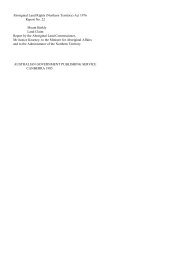
![pdf [107kB] - Department of Families, Housing, Community Services](https://img.yumpu.com/51272499/1/190x245/pdf-107kb-department-of-families-housing-community-services.jpg?quality=85)
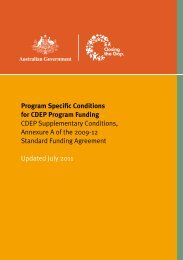
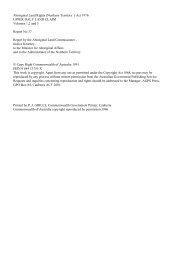
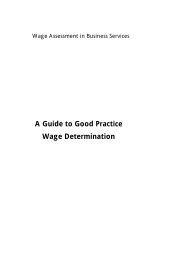
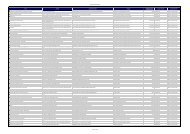
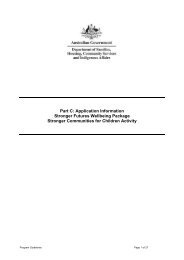
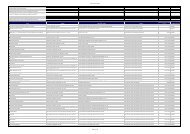
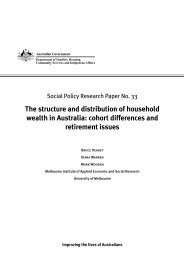
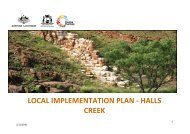
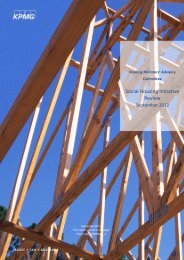
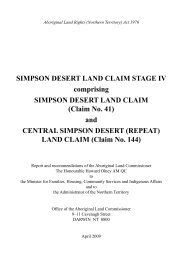
![Land Claim - pdf [278kB] - Department of Families, Housing ...](https://img.yumpu.com/47002639/1/184x260/land-claim-pdf-278kb-department-of-families-housing-.jpg?quality=85)
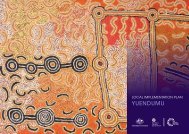
![Borroloola Land Claim - pdf [299kB] - Department of Families ...](https://img.yumpu.com/46103973/1/184x260/borroloola-land-claim-pdf-299kb-department-of-families-.jpg?quality=85)